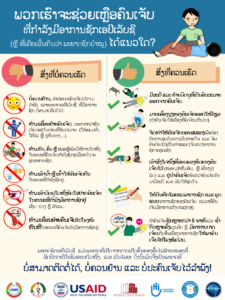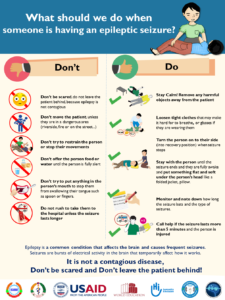(Please scroll down for English)
ມີຫຼາຍຄວາມເຊື່ອ ແລະ ເລື່ອງເລົ່າທີ່ແຕກຕ່າງກັນກ່ຽວກັບພະຍາດຊັກເອປີເລັບຊີ (ຫຼື ທີ່ເຄີຍເອີ້ນກັນວ່າ ພະຍາດຊັກບ້າໝູ), ສະນັ້ນ ເນື່ອງໃນວັນວັນພະຍາດຊັກເອປີເລີບຊີສາກົນ, ມື້ນີ້ອົງການເວີລ໌ດເອດຢູເຄຊັນ ປະຈຳ ສປປ ລາວ ແມ່ນຂໍຖືໂອກາດນີ້ທີ່ຈະສົ່ງເສີມຄວາມຮັບຮູ້, ຄວາມເຂົ້າໃຈທີ່ຖືກຕ້ອງ ແລະ ສົ່ງເສີມ ດ້ານການປິ່ນປົວທາງການແພດ, ການດູແລ ແລະ ການໃຫ້ສະຫນັບສະຫນູນແກ່ຜູ້ທີ່ເປັນ ພະຍາດຊັກເອປີເລັບຊີ.
ປະຊາຊົນຫຼາຍກວ່າ 50 ລ້ານຄົນໃນທົ່ວໂລກໄດ້ຮັບຜົນກະທົບຈາກພະຍາດຊັກເອປີເລັບຊີ ເຖິງວ່າ ພະຍາດດັ່ງກ່າວຈະເປັນໜຶ່ງໃນບັນຫາສຸຂະພາບ ທີ່ມີມາແຕ່ດົນນານທີ່ສຸດຢູ່ໃນໂລກກໍຕາມ ແຕ່ຫຼາຍຄົນ ກໍ່ຍັງມີຄວາມຢ້ານກົວ ແລະ ຄວາມເຂົ້າໃຈຜິດຕໍ່ກັບຜູ້ທີ່ມີອາການຊັກ. ແລ້ວອາການຊັກແມ່ນຫຍັງ? ອາການຊັກ ແມ່ນການທີ່ສະໝອງຂອງຄົນເຮົາ ມີການລົບກວນຂອງກະແສໄຟຟ້າສະໝອງຢ່າງກະທັນຫັນ ແລະ ຮຸນແຮງ ແລະ ເຮັດໃຫ້ສະໝອງບໍ່ສາມາດເຮັດວຽກໄດ້ປົກກະຕິໃນໄລຍະຊົ່ວຄາວ. ດັ່ງນັ້ນ ບຸກຄົນທີ່ມີອາການດັ່ງກ່າວ ອາດຈະລົ້ມລົງ ແລະ ຮ່າງກາຍຂອງພວກເຂົາມີອາການສັ່ນ ແລະ ຊັກ. ພະຍາດຊັກເອປີເລັບຊີ ສ່ວນຫຼາຍແມ່ນຈະໄດ້ຮັບການຮັກສາໂດຍຜ່ານການນຳໃຊ້ຢາທີ່ຊ່ວຍຫຼຸດຜ່ອນ ຫຼື ຢຸດການຊັກ.
ເຖິງຢ່າງໃດກໍ່ຕາມ, ຄວາມເຊື່ອ ແລະ ເລື່ອງເລົ່າຕ່າງໆທີ່ມີຢູ່ໃນຊຸມຊົນແມ່ນໄດ້ເຮັດໃຫ້ຜູ້ທີ່ເປັນພະຍາດ ຊັກເອປີເລັບຊີ ດໍາລົງຊີວິດທີ່ແຍກອອກຈາກສັງຄົມ, ພວກເຂົາມັກປະສົບກັບການຖືກຕໍາໜິ, ປົມດ້ອຍ ແລະ ຖືກຈໍາແນກຍ້ອນບັນຫາສຸຂະພາບຂອງເຂົາເຈົ້າທີ່ຄົນໃນຊົມຊຸມອາດຈະບໍ່ເຂົ້າໃຈ ແລະ ມີຄວາມເຂົ້າໃຈທີ່ຜິດ. ເຊິ່ງຫຼາຍໆຄວາມເຊື່ອ ແລະ ເລື່ອງເລົ່າຕ່າງໆນັ້ນແມ່ນບໍ່ມີຄວາມຈິງເລີຍ. ພະຍາດຊັກເອປີເລັບຊີບໍ່ແມ່ນ ພະຍາດຕິດຕໍ່. ພະຍາດຊັກເອປີເລັບຊີບໍ່ໄດ້ເກີດຈາກວິນຍານ-ຜີສາງ, ເວນກໍາ ຫຼື ຄຳສາບແຊ່ງໃດໆ. ຄົນທີ່ເປັນພະຍາດຊັກເອປີເລັບຊີບໍ່ໄດ້ເປັນຄົນທີ່ມີອາການປ່ວຍທາງຈິດ ຫຼື ພາວະບໍ່ໝັນຄົງທາງດ້ານອາລົມ. ພະຍາດຊັກເອປີເລັບຊີບໍ່ໄດ້ມີຜົນກະທົບກັບຕໍ່ກັບວິທີນຶກຄິດຂອງຄົນຜູ້ນັ້ນ ຍົກເວັ້ນຕອນທີ່ເຂົາເຈົ້າກຳລັງມີ ອາການຊັກ.ຜູ້ທີ່ເປັນພະຍາດຊັກເອປີເລັບຊີແມ່ນສາມາດມີສ່ວນຮ່ວມຢູ່ເຮືອນ ແລະ ພາຍໃນຊຸມຊົນ ຂອງເຂົາເຈົ້າ, ເຂົາເຈົ້າສາມາດຮຽນຮູ້, ເຮັດວຽກ ແລະ ໃຊ້ຊີວິດໄດ້ຢ່າງເຕັມສ່ວນ.
ໂຄງການ ໂອກາດ ໄດ້ເຮັດວຽກຮ່ວມກັບສະມາຄົມສໍາລັບຜູ້ທີ່ເປັນພະຍາດຊັກເອປີເລັບຊີ (APE) ເພື່ອສ້າງສື່ ໂປສເຕີທີ່ໃຫ້ຂໍ້ມູນພື້ນຖານກ່ຽວກັບພະຍາດຊັກເອປີເລັບໃຫ້ແກ່ຜູ້ເບິ່ງແຍງ ແລະ ຄົນໃນຊຸມຊົນເພື່ອຊ່ວຍໃຫ້ເຂົາເຈົ້າເຂົ້າໃຈເຖິງອາການໂດຍບໍ່ອິງຕາມຄວາມເຊື່ອ ຫຼື ເລື່ອງເລົ່າທີ່ເຄີຍໄດ້ຍິນມາ ແລະ ໃຫ້ພວກເຂົາຊອກຫາການດູແລເບິ່ງແຍງທີ່ເຫມາະສົມໂດຍສະເພາະໃນເວລາທີ່ມີຄົນອ້ອມຂ້າງກຳລັງ
ມີອາການຊັກ.
ໂຄງການ ໂອກາດ ໃຫ້ການສະໜັບ ສະໜູນທຶນໂດຍ ອົງການພັດທະນາສາກົນ ປະເທດ ສະຫະລັດ ອາເມລິກາ USAID ແລະ ຈັດຕັ້ງປະຕິບັດໂດຍ ອົງການ ເວີລດ໌ເອດຢູເຄຊັນ ປະຈຳ ສປປ ລາວ, ເພື່ອເສີມຂະຫຍາຍການເຂົ້າເຖິງການຮັກສາສຸຂະພາບ ແລະ ໂອກາດທາງດ້ານເສດຖະກິດ ສຳລັບຄົນທີ່ມີຄວາມພິການ, ພ້ອມທັງສະໜັບສະໜູນໃຫ້ ເຂົາເຈົ້າ ມີສ່ວນຮ່ວມໃນການອອກແບບນະໂຍບາຍ ແລະ ປະຕິບັດວຽກງານໃນການພັດທະນາມີແບບສ່ວນຮ່ວມ.
“Raising awareness and busting myths on International Epilepsy Day!”
Many myths exist about epilepsy, so today as we celebrate International Epilepsy Day, World Education Laos wants to raise awareness, promote better understanding and advocate for better medical treatment, care and support for people living with epilepsy.
Epilepsy affects over 50 million people around the world yet despite being one of the world’s oldest known health conditions there is fear and misunderstanding about people who have seizures. What is a seizure? The brain has a sudden and intense burst of electrical activity and causes the brain to temporarily not work properly. The person might fall down and their body shakes. Epilepsy is most commonly treated by medication that reduces or stops the seizures.
However many myths exist in communities that cause people living with epilepsy to live in the shadows, experience stigma and discrimination as their health condition is misunderstood. But many of these myths are not true. Epilepsy is not contagious. Epilepsy is not caused by spirit, karma or curses. People living with epilepsy are not mentally ill or emotionally unstable. Epilepsy has no effect on the way the person can think except during the seizure. People living with epilepsy are able to be active at home and within their community, they can study, work and lead an active, full life.
USAID Okard has been working with the Association for Patients with Epilepsy (APE) to produce a poster that provides basic information about epilepsy to caregivers and persons in the community to help dispel the myths about epilepsy and enable them to seek the proper care they need especially when seizures occur.
USAID Okard, funded by USAID and implemented by World Education, Inc., improves access to quality healthcare and economic opportunities for persons with disabilities, and supports design and implementation of disabilities inclusive policies.


